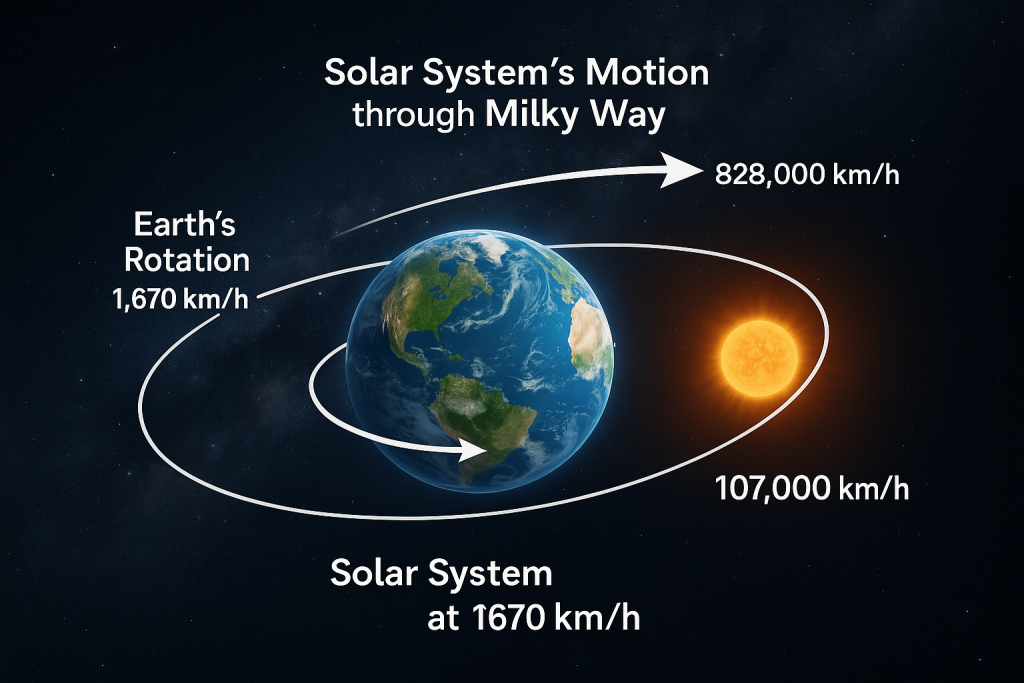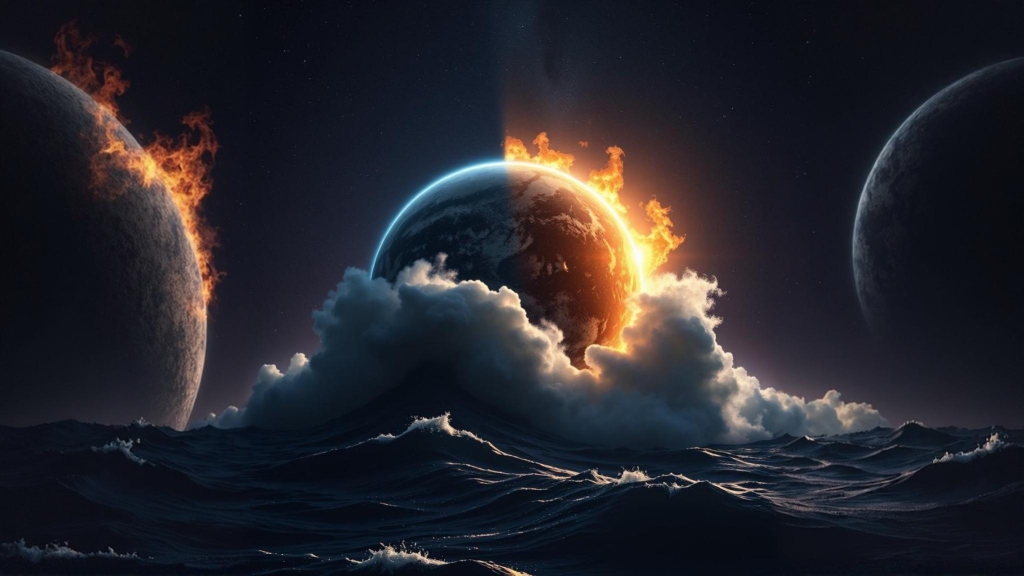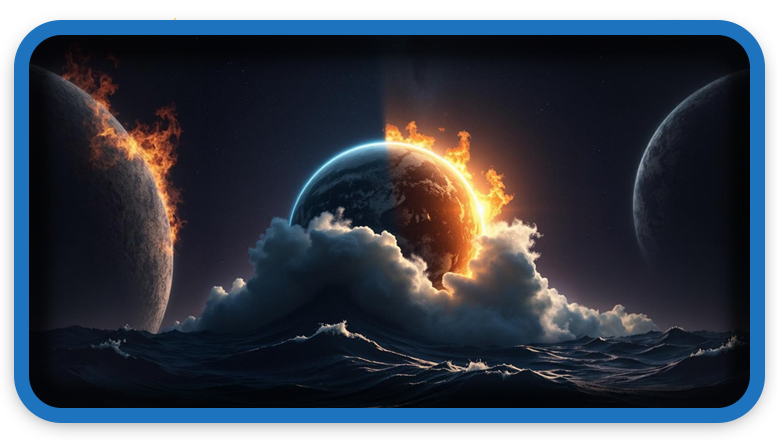⏲️ Estimated reading time: 6 min
🌍 What Would Happen If the Earth Stopped for a Few Seconds? A Journey Through Science and the Cosmos. If Earth suddenly stopped spinning, even for a few seconds, the results would be catastrophic. From supersonic winds to giant waves and tectonic chaos, life as we know it would collapse. Discover the science behind Earth’s motion and solar system speed.
Why Is This Question So Fascinating?
For thousands of years, humans have looked up at the skies, wondering how the universe works. We’ve learned that Earth is not static it spins on its axis and orbits around the Sun. But sometimes imagination takes us further: what if Earth suddenly stopped spinning, even for just a few seconds?
This seemingly simple question opens a deep scientific analysis, allowing us to understand physics, astronomy, and the delicate balance that sustains life on Earth. It also forces us to look beyond our planet and see how our solar system moves through the galaxy.
In this article, we will explore:
- the actual speed of Earth’s rotation;
- the catastrophic consequences of a sudden stop;
- short-term and long-term impacts on life;
- the speed and motion of our solar system through the Milky Way;
- the philosophical and cosmic implications of this scenario.
🌐 Earth’s Continuous Motion
Daily Rotation
Earth rotates constantly around its axis, completing one full spin in 23 hours, 56 minutes, and 4 seconds (a sidereal day). This rotation gives us the alternation of day and night.
- At the equator, the rotation speed is about 1,670 km/h (465 m/s).
- At higher latitudes, the speed gradually decreases, reaching nearly zero at the poles.
We don’t feel this rotation because the entire atmosphere and surface move along with us.
Orbit Around the Sun
Beyond rotation, Earth orbits the Sun at a staggering 107,000 km/h (30 km/s), completing one revolution every 365 days.
Motion of the Solar System
Things get even more fascinating when we realize that the entire solar system itself is on a massive journey through the galaxy, moving at incomprehensible speeds.
🚨 The Scenario: Earth Stops for a Few Seconds
Let’s imagine a hypothetical force capable of stopping Earth’s rotation instantly, even for just a few seconds. What would happen?
1. Inertia Would Devastate the Surface
According to Newton’s law of inertia, objects in motion tend to stay in motion unless acted upon by an external force.
- Humans, buildings, vehicles, oceans, and the atmosphere would not stop with Earth’s crust.
- They would continue moving at 1,670 km/h (at the equator).
- The result: an apocalypse-level storm of destruction. Cities wiped out, oceans rising into mega-tsunamis, and landscapes reshaped in seconds.
2. Supersonic Winds
The atmosphere would continue moving at its previous velocity.
- Winds exceeding 1,000 km/h would sweep the surface.
- Friction would ignite fires across continents.
- Ecosystems would collapse instantly.
3. Global Tsunamis
The oceans would surge forward violently.
- Waves hundreds of meters tall would inundate coastlines.
- Entire continents would be flooded.
- Shorelines would be permanently reshaped.
4. Earthquakes and Volcanic Eruptions
The sudden stop would unbalance tectonic plates.
- Mega-earthquakes would rupture continents.
- Dormant volcanoes would explode simultaneously.
- The energy release would dwarf all nuclear weapons on Earth combined.
5. Gravity Would Stay, But…
Gravity would remain constant, but the distribution of water and atmosphere would be altered. Within seconds, the Earth’s familiar geography would look completely alien.

🌞 If Earth Stopped Spinning Permanently
If the stop were permanent, day and night would change forever:
- One hemisphere would face the Sun endlessly.
- Temperatures would rise to unbearable levels.
- Oceans would boil away, vegetation would burn.
- The opposite hemisphere would be locked in eternal night.
- Temperatures would plummet close to absolute zero.
- Life would freeze.
The only survivable zone would be the twilight belt between day and night a thin strip of land where temperatures might remain tolerable.
🌀 If Earth Kept Orbiting Without Spinning
In this case, Earth would have “a year-long day.”
- Six months of daylight followed by six months of night.
- Climate extremes would destroy most ecosystems.
- Human civilization would collapse.
🌌 The Motion of the Solar System
Zooming out from Earth, the speeds become mind-blowing:
1. Earth Around the Sun
- Speed: 107,000 km/h.
- Orbit completed in 365 days.
2. The Solar System Around the Milky Way Center
- Speed: 828,000 km/h (230 km/s).
- One galactic orbit takes 225–250 million years.
- Location: Orion Arm of the galaxy.
3. The Milky Way in the Universe
- Estimated speed: 2.1 million km/h.
- Moving toward the Virgo Cluster, part of the Laniakea Supercluster.
🔬 The Science Behind the Scenario
Newton’s Law of Inertia
Explains why objects would continue moving after Earth stops.
Conservation of Energy
All kinetic energy from Earth’s rotation would be violently released.
Computer Simulations
NASA and other institutions show that while impossible naturally, such a scenario highlights the fragility of Earth’s systems.

🧩 Lessons from the Hypothesis
- Motion is life – Without rotation, Earth would be uninhabitable.
- Systems are interconnected – Atmosphere, oceans, and tectonics are all linked.
- The universe is dynamic – From atoms to galaxies, nothing stands still.
🏛️ Cultural and Philosophical Implications
Throughout history, myths and religions envisioned cosmic stops:
- The Bible describes the Sun “standing still” during Joshua’s battle.
- The Aztecs feared the Sun might one day fail to rise.
- Modern philosophy interprets this as a reflection of human fragility.
🛰️ The Cosmic Lesson
Even though Earth will never stop spinning naturally, the thought experiment teaches us:
- The balance of nature is fragile.
- We are small compared to cosmic forces.
- Motion at every scale sustains existence.
Final Insight
If Earth stopped even for a few seconds, civilization would end in a storm of winds, floods, and fire. This hypothetical scenario, while impossible, shows us the delicate balance of our planet’s rotation and its importance for life. At the same time, it reminds us that we are part of a cosmic dance where stars, planets, and galaxies move ceaselessly through the universe.
🔔 For more tutorials like this, consider subscribing to our blog.
📩 Do you have questions or suggestions? Leave a comment or contact us!
🏷️ Tags: Earth stop, Earth rotation, solar system speed, Milky Way, galaxy motion, astronomy, natural disasters, space science, universe facts, physics explained
📢 Hashtags: #Earth #Rotation #SolarSystem #Galaxy #MilkyWay #Astronomy #Science #Cosmos #Universe #Exploration
Only logged-in users can submit reports.
Discover more from HelpZone
Subscribe to get the latest posts sent to your email.

